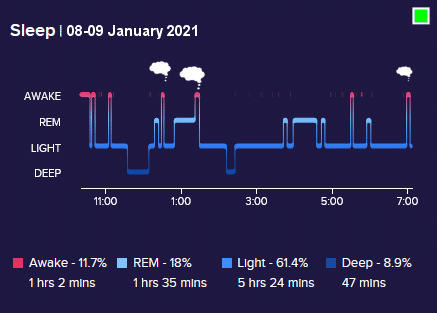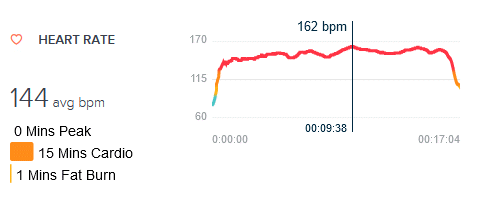Day 1 / 9th January 2021
I wore my Fitbit for the first time last night to monitor my sleep. Here is the resulting chart:

I woke at two distinct points in the night and recalled and wrote down dreams, along with the time. These, according to the chart, followed periods of REM sleep. I achieved 8 hours sleep - ideal. The first time I was awoke by sounds, the second time I seemed to wake naturally.
When my alarm went off at 7am I recalled I had had further dreams but dozed through them neglecting to write those down until I woke proper. Each of these corresponding points I marked with a thinking cloud. In all I had experienced what I felt was a good night's sleep so I marked the chart with a green square.
I had fallen asleep reasonably well I recalled, after reading in bed for half an hour or so. According to the Fitbit, I had had less than 1 hour of Deep sleep, with more than 5 hours of light sleep.
The average healthy adult gets roughly 1 to 2 hours of deep sleep per 8 hours of nightly sleep. [source]
Would more deep sleep benefit me, with less light sleep, and how could I achieve this?...
I did my usual morning routine of first getting a cup of tea and reading for an hour before going out for a run.

I don't warm up (perhaps I should), I simply walk out of the door and start running. Nor do I 'warm down' afterwards. It was a chilly morning (the coldest of the winter so far); my fingerless gloves not doing anything to keep my fingers from getting cold.
The chart shows my heart rate quickly rising, averaging 144 bpm during the course of the activity, peaking at 162 bpm midway, and staying close to that for the duration. The activity provided 15 minutes of cardio workout. It was a nice run (not particularly strenuous), lasting little more than 17 minutes and distancing around 2 miles*.
Later I went out for a cycle to the shops:
For the above chart I combined that of the Fitbit app, and Google Maps' terrain chart, since I figured that would put the former into perspective. The latter is in two parts, between which is a pause in my cycling while I was briefly at my destination (the supermarket). I realised the weather was also a factor so I overlaid weather details for the time, in particular the wind speed (I factored in the rough direction of the wind for my outbound and return journeys. In a similar fashion to my night's sleep I put a green box at the top right to indicate my feeling of the ride: it was a good ride with ample effort.
My heart's bpm peaked at 169/170 for each part of the trip, 8 more than my morning run confirming that I took it easy for the run (I pushed at various points during the ride, particularly on the way back when I was trying to keep up with a cyclist ahead of me), and also up the various hills. I don't feel like I had any more to give than 170 bpm so this will be a good factor going forward...
Can I increase my heart's bpm?
My heart's average bpm for the duration of my trip was 125.
Can I increase this for the same trip on another day?
The weather was on my side today, with the wind on my tail on the way out, but against me on the way home (but it was only reported as being 10mph). The only other factor against me was that for the return trip I was carrying a few KG of shopping.
*I have now found this out:
When running, you should train at 50 to 85 percent of your maximum heart rate. To calculate the maximum rate, subtract your age from 220. If your heart rate dips below this, you might want to pick up the pace to get better results from your workout. [source]
I'm not sure if that is the average bpm should be 50-85%, or if it should peak at no more than 85% of your maximum. Either way, there is room for improvement.
Cycling, it seems, will more
complicated since there are more
factors; the route and hills
encountered, weather, and if I'm
carrying a load in my
panniers... which this afternoon
I was.
